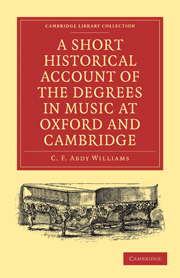 A Short Historical Account of the Degrees in Music at Oxford and Cambridge
A Short Historical Account of the Degrees in Music at Oxford and Cambridge Book contents
- Frontmatter
- PREFACE
- Contents
- CHAPTER I THE ORIGIN OF ACADEMICAL DEGREES IN GENERAL
- CHAPTER II THE EARLIEST RECORDS OF DEGREES IN MUSIC
- CHAPTER III EARLY MUSICAL STUDY AT THE UNIVERSITIES.—BOETHIUS
- CHAPTER IV THE MUSIC ACT, MUSIC SPEECH OR LECTURE, AND MUSIC SCHOOL
- CHAPTER V THE ESTABLISHMENT OF PROFESSORS OF MUSIC AT THE UNIVERSITIES
- CHAPTER VI DEVELOPMENT OF THE MODERN REQUIREMENTS FOR MUSICAL DEGREES
- CHAPTER VII THE CULTIVATION OF MUSIC AT THE UNIVERSITIES
- CHAPTER VIII ACADEMICAL DRESS.—DEGREE CEREMONIES, FEASTS.—AN EARLY EXAMINATION FOR THE B.A. DEGREE
- CHAPTER IX OXFORD GRADUATES IN MUSIC, WITH BIOGRAPHICAL SKETCHES
- CHAPTER X CAMBRIDGE GRADUATES IN MUSIC, WITH BIOGRAPHICAL SKETCHES
- APPENDIX: CONTAINING ACCOUNTS OF THOSE PERSONS WHO ARE MENTIONED IN HISTORY AS GRADUATES, BUT WHOSE NAMES DO NOT APPEAR IN THE UNIVERSITY RECORDS
- INDEX
CHAPTER IV - THE MUSIC ACT, MUSIC SPEECH OR LECTURE, AND MUSIC SCHOOL
Published online by Cambridge University Press: 05 October 2010
- Frontmatter
- PREFACE
- Contents
- CHAPTER I THE ORIGIN OF ACADEMICAL DEGREES IN GENERAL
- CHAPTER II THE EARLIEST RECORDS OF DEGREES IN MUSIC
- CHAPTER III EARLY MUSICAL STUDY AT THE UNIVERSITIES.—BOETHIUS
- CHAPTER IV THE MUSIC ACT, MUSIC SPEECH OR LECTURE, AND MUSIC SCHOOL
- CHAPTER V THE ESTABLISHMENT OF PROFESSORS OF MUSIC AT THE UNIVERSITIES
- CHAPTER VI DEVELOPMENT OF THE MODERN REQUIREMENTS FOR MUSICAL DEGREES
- CHAPTER VII THE CULTIVATION OF MUSIC AT THE UNIVERSITIES
- CHAPTER VIII ACADEMICAL DRESS.—DEGREE CEREMONIES, FEASTS.—AN EARLY EXAMINATION FOR THE B.A. DEGREE
- CHAPTER IX OXFORD GRADUATES IN MUSIC, WITH BIOGRAPHICAL SKETCHES
- CHAPTER X CAMBRIDGE GRADUATES IN MUSIC, WITH BIOGRAPHICAL SKETCHES
- APPENDIX: CONTAINING ACCOUNTS OF THOSE PERSONS WHO ARE MENTIONED IN HISTORY AS GRADUATES, BUT WHOSE NAMES DO NOT APPEAR IN THE UNIVERSITY RECORDS
- INDEX
Summary
As far as can be gathered from early graces, no composition or exercise was demanded from candidates for musical degrees until early in the sixteenth century, at which period the Universities began to grant the degrees only on condition of the performance by the candidate of a specified piece of music in the University Church at “Act time.” Apparently this condition was at first imposed, not as a test of the candidate's fitness for a degree, but in order that music might form a dignified and solemn adjunct to the exercises and ceremonies of the Comitia, or Act, and other important public occasions. All the Cambridge graces concerning degrees in music from about 1516 require the candidate to compose a mass, song, or canticum, &c, to be performed before the University in St. Mary's Church, on the day of the Comitia; and from Wood's accounts the same conditions prevailed at Oxford.
It was enacted at Cambridge in 1608 that the Comitia or great commencement should be closed with a music Act, “with a hymn by the inceptor in this faculty.” And the Oxford statutes of 1636 contain the following enactment: “Concerning the Music Act. After the exercise of the artists (i.e., those who are taking degrees in Arts) in the Act is finished, if there is any who is to take a degree in music he shall perform one or more cantilenas of six or eight parts, with harmony of voices and instruments. This being finished, he shall receive from the Savilian professors the solemnities of his creation.”
- Type
- Chapter
- Information
- A Short Historical Account of the Degrees in Music at Oxford and CambridgeWith a Chronological List of Graduates in that Faculty from the Year 1463, pp. 27 - 33Publisher: Cambridge University PressPrint publication year: 2009First published in: 1893


